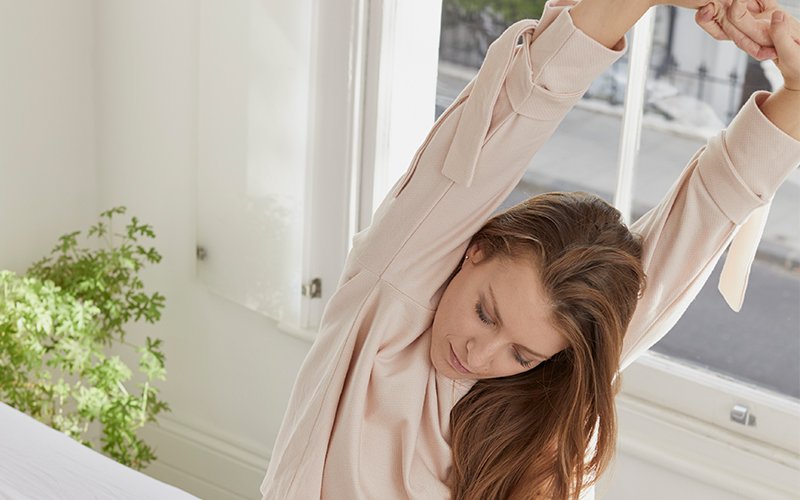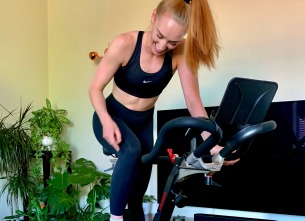Life as we know it and what we know as ‘normal’ has changed dramatically over the last few months. It’s no surprise that these changes are having an impact on the quality of our sleep.
A lack of exposure to natural light, feeling a threat to our survival, being isolated and a lack of human contact can all make us feel anxious. And when we feel anxious, our sleep naturally gets lighter. Even working from home can wreck our sleep routine – especially if you end up reaching for your laptop before getting out of bed.
We all need our sleep to function properly! Sleep enables the body to repair, and be fit and ready for another day. Getting adequate sleep may also help prevent excess weight gain, heart disease, and reduce illness duration.
But, just how easy is it to convince your brain to switch off and let you sleep when all we are reading about in the news, watching on TV and talking to our friends and loved ones about is the current pandemic?
Here are six ways to get a better night’s sleep if you’re feeling a bit anxious.
Exercise Regularly
Our daily routines may be very different but that doesn’t mean being active has to stop. A regular exercise routine can help to reduce your stress levels and contribute to a more sound and restful deep sleep. Just 5 minutes of exercise can trigger anti-anxiety responses in the body. Join us on Digme at Home and get those indoor-phins going! Your first 30 days are on us with our free trial. With Live and On Demand Cycle, Yoga, HIIT, Strength and Breathwork classes, there's something for every one and best yet Digme at Home works around your schedule.
Spread Gratitude
Gratitude is the simple act of being grateful and thankful for what you have rather than reaching for or seeking something you don’t have that you think will make you happier. In a moment I’d like you to pause, close your eyes, take a deep breath in, sigh it out, then take a minute to think about three things in your life that you are grateful for. They can be the small, big, people, places, experiences, activities, practices… anything. Go on, try it. Now notice how you feel.
Better? Read more about practising gratitude here.
Structure Your Day
Be strict with work time and YOU time by creating a weekly schedule. Give yourself plenty of breaks, and try and be consistent with your meal and sleep times. An NHS article states that "going to bed and getting up at roughly the same time every day will programme your body to sleep better. Choose a time when you're likely to feel tired and sleepy.”
Natural Light
This one goes back to the cave ages! Think about it… humans evolved spending a lot of time outside and the day started with the sun rising. We spend a lot more time indoors nowadays, but exposure to sunlight can still help to regulate our sleeping patterns. Start your day by opening your curtains or by going for a walk and exposing yourself to the sun. At night, pull down your blinds or draw your curtains to help to cocoon you in darkness.
Sleep Spray
This Works Sleep Spray is proven to help you fall asleep faster and wake feeling more refreshed. The award winning Sleep Spray is made with natural essential oils, an aromatherapeutic Superblend of Lavender, Vetivert and Camomile, and calms both mind and body to soothe you to sleep.
Give the bottle a good shake then spray it directly onto your bed linen to help help reduce sleep anxiety and improve sleep quality. Your natural movements during the night will release the relaxing fragrance while you sleep.
Breathing
Breathwork – the simplest, yet most powerful tool available to us any place, any time and it doesn’t cost a penny.
The quality of your breath provides a perfect mirror to the state of your inner world. This is because your brain auto-regulates your breath pattern which is especially relevant in the uncertain times that we’re living because what happens when we get stressed is our mind sends a signal to our body that we’re in danger, our body tenses up and our breath shortens and contracts.
Now, this isn’t necessarily a problem if it happens from time to time, but if we’re continually stressed over a period of time, because the body is a habit forming machine – the more the body can tense up and the more the breath can tighten and contract to the extent that the breath can permanently vacate the belly and become short, sharp and shallow and in upper chest.
Read our blog, or join us for a Breathwork session on Digme at Home.
Yin Yoga
In Yin we ground down, slowing down the body so we can slow down the mind. It’s less about doing and more about being. And switching off your mind is key to a good nights sleep!
Book one of our Live Yin classes on Digme at Home now and switch off you mind. The class will be about ten poses held for two to four minutes, with gravity doing all the work so you can release, let go and go deep. It’s the best stretch out there. (Open to all levels.)
We hope our top tips help you to get a better night sleep.






COMMENTS (0)
Be the first to comment!
Please login to comment